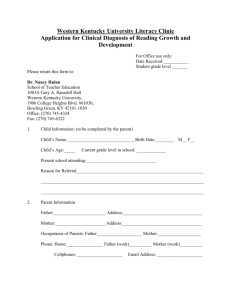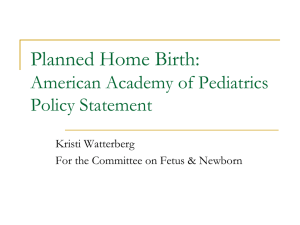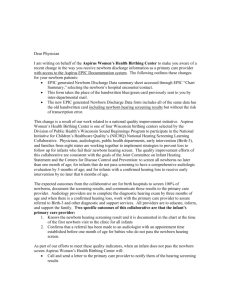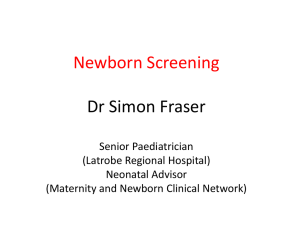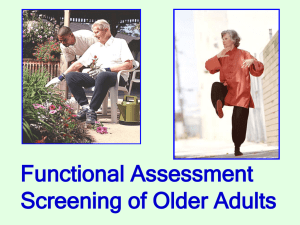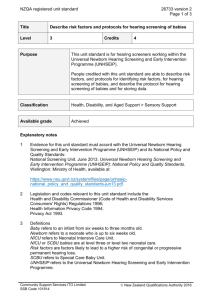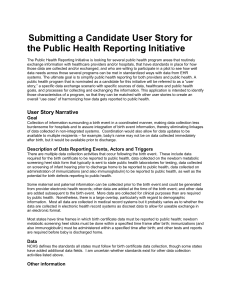Newborn Hearing Screening
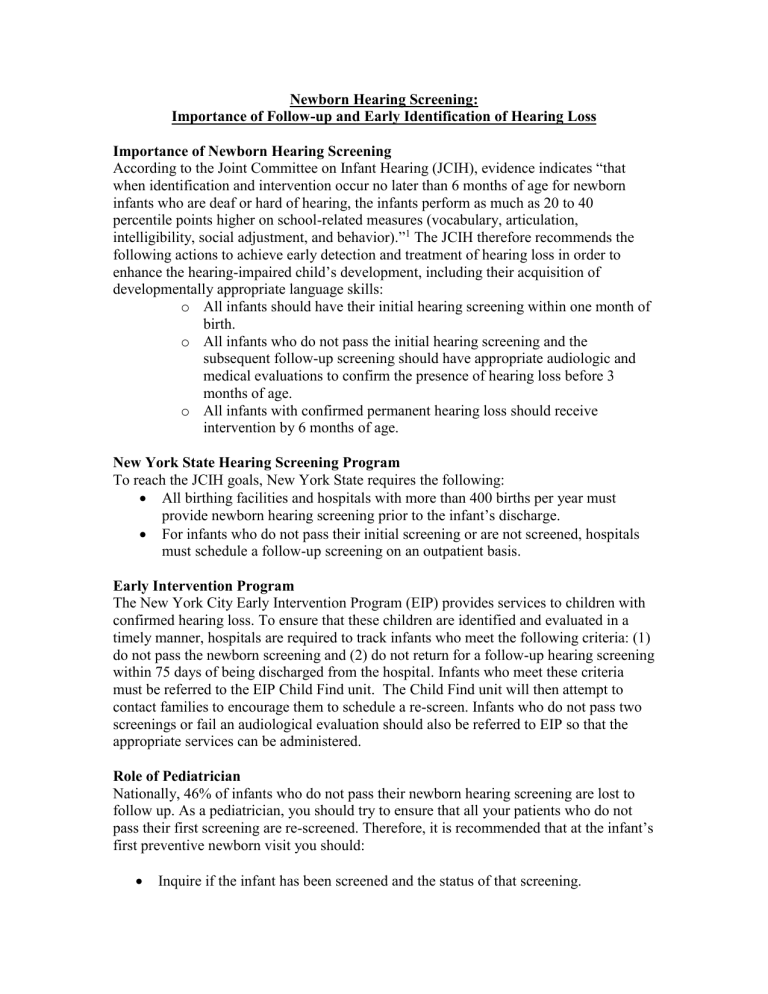
Newborn Hearing Screening:
Importance of Follow-up and Early Identification of Hearing Loss
Importance of Newborn Hearing Screening
According to the Joint Committee on Infant Hearing (JCIH), evidence indicates “that when identification and intervention occur no later than 6 months of age for newborn infants who are deaf or hard of hearing, the infants perform as much as 20 to 40 percentile points higher on school-related measures (vocabulary, articulation, intelligibility, social adjustment, and behavior).”
1
The JCIH therefore recommends the following actions to achieve early detection and treatment of hearing loss in order to enhance the hearing-impaired child’s development, including their acquisition of developmentally appropriate language skills: o All infants should have their initial hearing screening within one month of birth. o All infants who do not pass the initial hearing screening and the subsequent follow-up screening should have appropriate audiologic and medical evaluations to confirm the presence of hearing loss before 3 months of age. o All infants with confirmed permanent hearing loss should receive intervention by 6 months of age.
New York State Hearing Screening Program
To reach the JCIH goals, New York State requires the following:
All birthing facilities and hospitals with more than 400 births per year must provide newborn hearing screening prior to the infant’s discharge.
For infants who do not pass their initial screening or are not screened, hospitals must schedule a follow-up screening on an outpatient basis.
Early Intervention Program
The New York City Early Intervention Program (EIP) provides services to children with confirmed hearing loss. To ensure that these children are identified and evaluated in a timely manner, hospitals are required to track infants who meet the following criteria: (1) do not pass the newborn screening and (2) do not return for a follow-up hearing screening within 75 days of being discharged from the hospital. Infants who meet these criteria must be referred to the EIP Child Find unit. The Child Find unit will then attempt to contact families to encourage them to schedule a re-screen. Infants who do not pass two screenings or fail an audiological evaluation should also be referred to EIP so that the appropriate services can be administered.
Role of Pediatrician
Nationally, 46% of infants who do not pass their newborn hearing screening are lost to follow up. As a pediatrician, you should try to ensure that all your patients who do not pass their first screening are re-screened. Therefore, it is recommended that at the infant’s first preventive newborn visit you should:
Inquire if the infant has been screened and the status of that screening.
If infant was not screened or did not pass their initial screening, encourage and assist the family in scheduling a screening either at the birth hospital or at an outpatient facility.
If infant did not pass both the inpatient and outpatient screening, refer the infant to Early Intervention or to a qualified audiologist for full audiological evaluation.
If an audiological evaluation confirms a hearing impairment, refer the infant to
Early Intervention for full evaluation.
Emphasize to parents the importance of hearing screening and subsequent hearing interventions if hearing loss is confirmed.
Useful Resources
Universal Newborn Hearing Screening, Diagnosis, and Intervention - Guidelines for
Pediatric Medical Home Providers http://www.medicalhomeinfo.org/screening/Screen%20Materials/Algorithm.pdf
When A Newborn Doesn't Pass the Hearing Screen: How Medical and Other
Professionals Can Help Increase the Number of Infants Who Return for a Follow-Up
Evaluation http://www.medicalhomeinfo.org/screening/Screen%20Materials/NIDCD%20Fact%20Sh eet%20How%20Medical%20and%20Other%20Professionals.pdf
Early Hearing Detection and Intervention: Role of the Primary Care Physician - CME
Teleconference Power Point Presentation http://www.infanthearing.org/medicalhome/aapteleconference/AAPTeleconference2003
1015.ppt
New York State Newborn Hearing Screening Guidelines http://www.health.state.ny.us/community/infants_children/early_intervention/memo03-
3.htm
Joint Committee on Infant Hearing http://www.jcih.org/
1 American Speech-Language-Hearing Association. (2007). Executive Summary of Joint Committee on
Infant Hearing Year 2007 Position Statement: Principles and Guidelines for Early Hearing Detection and
Intervention Programs. Available from www.asha.org.
Prepared by Dr. Prashil Govind, Medical Director, NYC Early Intervention Program
Reviewed and submitted by AAP Chapter 2 Committee on Developmental-
Behavioral Pediatrics/Children with Disabilities
